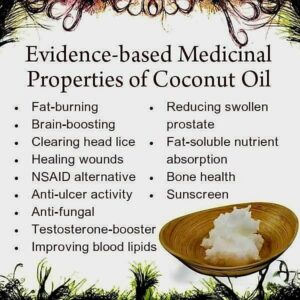
Beyond the Hype: The Evidence-Based Medicinal Properties of Coconut Oil
Coconut oil has transitioned from a misunderstood fat to a celebrated superfood in recent years. While it’s a popular choice for cooking and skincare, its benefits extend far deeper into the realm of therapeutic health. Moving beyond anecdotal claims, let’s explore the compelling, evidence-based medicinal properties that make coconut oil a unique and powerful natural remedy.
1. A Metabolic Powerhouse: Fat-Burning and Energy
One of the most well-known properties of coconut oil is its ability to aid in fat loss. This is primarily due to its high concentration of Medium-Chain Triglycerides (MCTs). Unlike long-chain fats found in most other oils, MCTs are transported directly to the liver, where they are rapidly converted into energy or ketones. This process:
· Boosts Metabolism: Increases energy expenditure, helping you burn more calories throughout the day.
· Promotes Satiety: The ketones produced can have an appetite-reducing effect, leading to a natural reduction in calorie intake.
2. Brain and Neurological Health
The ketones produced from MCTs are not just for the body—they are a crucial, alternative fuel source for the brain. This has significant implications:
· Brain-Boosting Fuel: Ketones provide a steady, efficient energy source for brain cells, which may improve cognitive function, focus, and memory.
· Therapeutic Potential: Research is ongoing into the role of MCTs and coconut oil in supporting brain health in neurological conditions like Alzheimer’s and epilepsy, where the brain’s ability to use glucose is impaired.
3. Skin and Scalp Superstar
Coconut oil’s antimicrobial and moisturizing properties make it a versatile topical agent.
· Healing Wounds: Applied topically, it forms a protective barrier, keeps the wound moist, and its antimicrobial properties can prevent infection, promoting faster healing.
· Anti-Fungal Activity: Its potent fatty acids, like lauric acid, are effective against fungal infections, most notably Candida albicans and ringworm.
· Clearing Head Lice: Studies have shown that coconut oil is effective at suffocating and immobilizing head lice. When combined with anise spray, it was found to be significantly more effective than the common insecticide permethrin.
· Natural Sunscreen: It has a natural SPF of around 4-6, providing mild protection against UVB rays. It’s often used as a base in homemade sunscreen recipes or as an after-sun moisturizer.
4. Internal Health and Hormonal Support
The benefits of coconut oil also work from the inside out, supporting everything from nutrient absorption to hormone balance.
· Fat-Soluble Nutrient Absorption: Coconut oil helps the body absorb vital fat-soluble vitamins (A, D, E, and K) and minerals like calcium and magnesium, directly supporting bone health.
· Testosterone-Booster and Prostate Health: While not a direct magic bullet, the healthy saturated fats in coconut oil are crucial for the production of cholesterol, which is a precursor to hormones like testosterone. A healthy hormonal balance is intrinsically linked to overall male health, including prostate function.
· Improving Blood Lipids: Contrary to old beliefs, the unique saturated fats in coconut oil can actually improve the lipid profile by raising HDL (“good”) cholesterol. This creates a more favorable HDL-to-LDL ratio, which is a key marker for heart health.
· Anti-Ulcer Activity: Some animal studies suggest that coconut oil may help protect the stomach lining and combat the bacteria H. pylori, which is a major cause of stomach ulcers.
5. Soothing Pain and Inflammation
· NSAID Alternative: The anti-inflammatory and analgesic (pain-relieving) properties of coconut oil, particularly virgin coconut oil, have been demonstrated in studies. It can be a natural alternative for managing inflammation and pain, potentially reducing the need for non-steroidal anti-inflammatory drugs (NSAIDs) in certain situations, such as reducing swollen joints from arthritis.
A Note on Usage
While the evidence is promising, it’s important to incorporate coconut oil wisely. It is a calorie-dense food, so moderation is key. Opt for high-quality, virgin (unrefined) coconut oil to retain its beneficial compounds. As with any natural remedy, consult with a healthcare professional before using it to address specific health conditions.
In conclusion, coconut oil is more than just a culinary trend. Its unique biochemical profile grants it a wide range of proven therapeutic applications, making it a valuable addition to both your pantry and your medicine cabinet.
